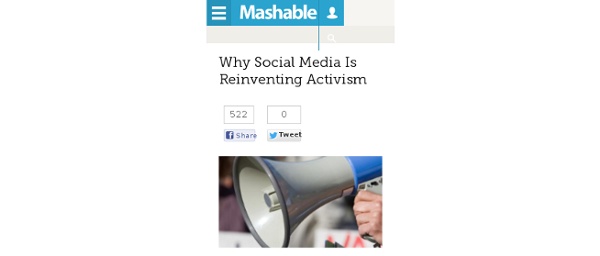4 Real Challenges to Crowdsourcing for Social Good
Geoff Livingston co-founded Zoetica to focus on cause-related work, and released an award-winning book on new media Now is Gone in 2007. For its 40th anniversary, political non-profit Common Cause re-examined its core values and wrote almost 40 theses for the Internet era in the style of The Cluetrain Manifesto. The organization needed to know that these restated values were still in sync with its stake holders and needed its online community to provide feedback. For a month and half the organization tried to socialize the theses, getting lukewarm responses, but receiving thumbs-up on Facebook posts about individual theses, and the occasional comment. Common Cause's difficulties and eventual success reflect some truths about this harder-than-it-seems social media strategy. Some of the hurdles may seem obvious. Other hurdles require experience. Disclosure: My company Zoetica provided Common Cause a social media strategy. 1. The old, "what's in it for me?" 2. 3. 4.
¿Tu ONG quiere rediseñar su web?
En tanto que una web sirve como escaparate de una empresa, organización, grupo, proyecto… es “ley de vida” que cada cierto tiempo se actualice, no sólo en contenidos, sino también en cuanto al aspecto se refiere. Cuestiones como el diseño, “usabilidad” y tecnología … afectan directamente a la sensación de confianza que se genera en los usuarios. Es parecido a la moda… hay diseños de páginas web que son “típicamente” ochenteros y dan una sensación muy poco positiva de la organización que las mantiene sin cambios. Por otro lado los hábitos de los internautas evolucionan y se acomodan en las nuevas herramientas que proporciona la tecnología. Por ejemplo la interacción con redes sociales. En fin, te propongo unas cuantas reflexiones para plantearte antes de llevar a cabo una remodelación o resdiseño de la página web de tu ONG. Lo primero de todo, antes de emprender cualquier rediseño, tu organización debe tener claras sus metas y a quién va a dirigir la página web.
LE CERCLE DES ONG ONLINE
HOW TO: Turn Slacktivists into Activists with Social Media
Geoff Livingston co-founded Zoetica to focus on cause-related work, and released an award-winning book on new media Now is Gone in 2007. Throughout the non-profit world, organizations struggle with social media's impact on the volunteer and donor cycle. The rise of "slacktivism" — doing good without having to do much at all — challenges organizations to rethink the way they cultivate their core volunteers and donors. There are some important social media strategies for transforming those one-click "slacktivists" into fully engaged activists. Here are five tips from some of the best in the non-profit business. 1. The term slacktivism has its own baggage. "It irritates me that we have invented this term as a pejorative way to describe what should be viewed as the first steps to being involved in a cause in 2010," said Katya Andresen, Chief Operating Officer of Network for Good. 2. Social media provides a new first step on the engagement ladder. 3. 4. 5.
Les nouveaux médias non marchands » Edito
Paris, le 30 juin 2012 L’année précédente s’est terminée avec + 22% de croissance des investissements privés dans l’intérêt général. La part des entreprises, des associations, des fondations, des trusts, des mutuelles, fait dorénavant jeu égal avec les apports de l’État plus totalement « providence ». L’essor des nouveaux médias a joué un rôle majeur dans ce développement et dans l’implication du citoyen « eco-conso-don-acteur ». Entreprises et OSBL (Organisations Sans But Lucratif) se sont fortement rapprochées. Je me souviens encore de ce temps ou les deux acteurs « marchands » et « non-marchands » étaient clairement séparés… et se regardaient sans oser se parler et encore moins collaborer. Les citoyens, eux aussi, se sont exprimés contre les ponctions fiscales obligées pour regagner leur libre-arbitre et retrouver au travers du don et de la consommation-responsable une liberté et un déterminisme affiché dans la prise en charge de l’intérêt général. Eric Dutertre, Président d’Excel
Utilisation de Facebook pour une association (étude du cas Loup Festayre)
Lors d’une formation à distance sur « le web 2.0 appliqué aux associations », nous parlions avec Odile de Trajectoires, de l’utilisation de Facebook. Voici aujourd’hui une illustration de l’utilisation de Facebook par l’association « Bandas y penas, culture et patrimoine » qui organise le Festival des Bandas de Condom. Commençons par un inventaire des outils de communication web de l’association : - Un site officiel : avec toutes les informations pratiques - Une page sur Youtube qui diffuse notamment 2 vidéos qui visent à générer du buzz ramdam autour du Festival - Un profil ouvert sur Facebook au nom de Loup Festayre - Un groupe actif sur Facebook : les amis de Loup Festayre (1 025 membres à ce jour), qui est en fait le groupe officiel du Festival Donc, à première vue, l’association utilise les réseaux sociaux comme complément à son site institutionnel. Le 1er point, la mise en place d’un community manager généreuse de la fête dans le Sud Ouest. ou - Proximité



